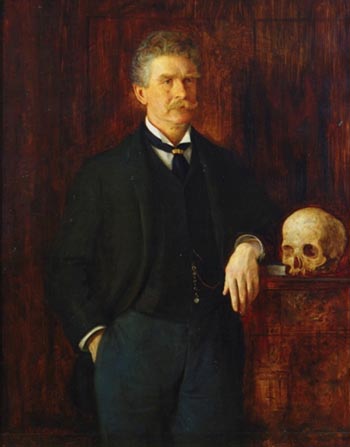Learn
Continue to answer the Unit 6 Notes as you review the lesson.

Ambrose Bierce (1842 - 1913), like Dunbar, was also from the state of Ohio. He moved with his family a few years later to Indiana.
When he was seventeen, he enrolled at Kentucky Military Institute. In 1861, Bierce joined the Union Army after President Lincoln called for 75,000 volunteers.
He fought in some of the most infamous battles like Shiloh, Corinth, Stones River, and Chickamauga.
In 1864, Bierce was shot in the head during the battle at Kennesaw Mountain. He was hospitalized for several months and continued to have blackouts and dizziness. Subsequently, he moved to Alabama to become a Treasury agent.
Later, he moved to San Francisco to embark on a journalistic career. He wrote a column for the Argonaut, Wasp, and San Francisco Sunday Examiner.
There is a mystery surrounding his death in 1913. When Bierce was seventy-one, he moved to Mexico to observe the Pancho Villa revolution. He left his niece a letter that suggests he may be ending his life. Listen to what he wrote.
Look for similar uses of description and imagery as you read "An Occurrence at Owl Creek Bridge."

The Owl Creek Bridge may have been similar to this bridge. This picture was taken in Tennessee during the Civil War. You can see a Union soldier standing guard over the bridge.
Look over the words below. If there are others in the story that you don't know, look up the definition at Merriam-Webster.
| Deference - respect or honor | Effaced - erased |
| Elude - avoid | Embrasure - hole, opening |
| Gesticulated - made gestures | Imperious - bossy, fussy; controlling |
| Ineffable - indescribably | Malign - evil |
| Oscillating - swinging back and forth | Perilous - dangerous |
| Poignant - vivid and sharp | Sentinel - a soldier or guard who job is to stand and keep watch |
| Secessionist - one who favored having the Southern states withdraw from the Union |
Read "An Occurrence at Owl Creek Bridge."
Psychological time occurs when a person dwells on a situation mentally. Think about something you saw on the news that was tragic. Did you think about it for several minutes because it was so gruesome? This is psychological time, the reason you lose the present moment and get trapped in a problem; it burdens you, but there is nothing you can do about it.
Bierce makes his readers think Farquhar survives and escapes death, but in reality, this fantasy is just in Farquhar's head moments before his true death. The reader's perception of time is skewed because Farquhar is in psychological time.
 |
 |